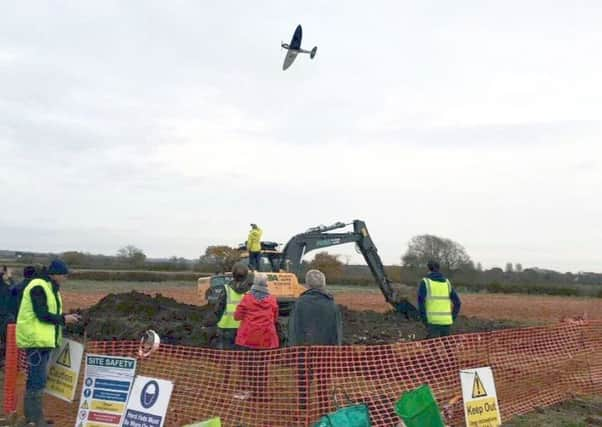WWII Spitfire recovered from Owersby field


The Mark I Spitfire crashed at South Owersby on July 4 1940, killing its pilot, 24-year-old Emrys Ivor Lewis.
A team of aviation archaeologists from across the UK, together with a team from Winchester University, excavated the remains of the plane over two days.
Advertisement
Hide AdAdvertisement
Hide AdAnd they were joined on the second day by members of Emrys’s family.


Emrys was the uncle of Beryl Wilson (82), who travelled from her home in Liverpool to see the crash site, along with her two daughters, Karen and Janet, and other relatives from Canada.
Gareth Jones, whose team travelled from Wales to lead the excavation, said: “It was both emotional and exciting - a truly memorable moment for everyone involved.
“The site was know by the team for many years and along with the next of kin an excavation was planned to answer some questions that remained outstanding for 77 years.”
Advertisement
Hide AdAdvertisement
Hide AdThe plane was more than 20 feet underground, but substantial remains of the Spitfire were uncovered, including, propellor blades, cockpit controls, tail wheel and finally the intact rolls Royce merlin engine.


Following the excavation, a minute’s silence was held.
The plane was one of three spitfires flying from RAF Kirton Lindsey, on that afternoon in 1940, on a mission looking for advancing Luftwaffe in the build up to the start of the Battle of Britain.
Whilst returning to base, the Spitfire got into difficulties flying through thick cloud and was seen to dive vertically into the ground at full power.
The pilot was buried with full military honours on July 11, 1940 in North Wales.


Advertisement
Hide AdAdvertisement
Hide AdEmrys was one of three brothers and the son of Thomas Hugh and Elinor Lewis.
As a finale to the excavation, a Spitfire, which came specially for the event from Duxford, performed a flypast and victory roll to remember Emrys Ivor Lewis (pictured left).
Gareth said: “The team would like to thank the Ministry of Defence, who gave permission for the excavation under the protection of military remains act, the land owner and Winchester University who all helped make the project such a memorable occasion for the family.”
Gareth and his specialist team have undertaken around 500 similar excavations between them.
He added: “Like many of the others , the South Owersby excavation was filmed for a documentary which we expect to be on television sometime next year.”